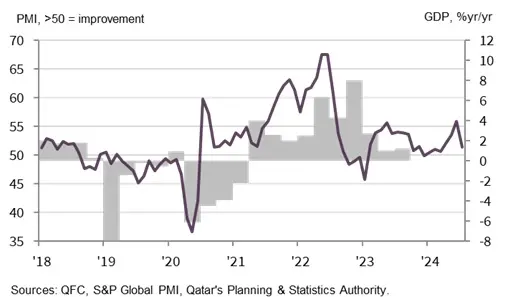PHOTO
- Expectations for activity highest since September 2023
- Faster rate of backlog clearance as productivity improves
Doha, Qatar– Qatar's non-energy private sector continued to expand at the start of the second half of 2024, according to the latest Purchasing Managers’ Index™ (PMI®) survey data from Qatar Financial Centre (QFC) compiled by S&P Global. Output and new orders both grew at solid rates that were broadly in line with their respective long-run survey trends, while companies were increasingly confident regarding the 12-month outlook. Firms also made inroads into outstanding business, with backlogs falling the most since January 2023. Overall cost pressures were muted as higher purchase prices were partly offset by lower staff costs. Prices charged for goods and services were broadly stable.
The Qatar PMI indices are compiled from survey responses from a panel of around 450 private sector companies. The panel covers the manufacturing, construction, wholesale, retail, and services sectors, and reflects the structure of the non-energy economy according to official national accounts data.
The headline Qatar Financial Centre PMI is a composite single-figure indicator of non-energy private sector performance. It is derived from indicators for new orders, output, employment, suppliers’ delivery times and stocks of purchases.
The PMI registered 51.3 in July, down from June's 23-month high of 55.9 but still signalling an overall improvement in business conditions in the non-energy private sector economy. It was slightly below the long-run trend level of 52.3 (since April 2017).
July data signalled a strengthening in demand in the Qatari non-energy economy. The level of incoming new orders expanded for the seventeenth time in 18 months, and at a solid rate that was broadly in line with the long-run survey trend. Companies reported new orders due to strong reputations, customer trust and high-quality goods and services.
The sustained increase in new business in July resulted in another robust expansion in total activity. Output has risen continuously for over four years except for two brief pauses in January and December last year. Despite rising demand for goods and services, companies were able to reduce the volume of outstanding orders at the fastest rate since January 2023, due to improved productivity.
Confidence regarding the next 12 months strengthened to a ten-month high in July. Firms reported the planned opening of new locations, adoption of new technologies, investment in training and latest marketing strategies.
Demand for inputs rose in July, as purchasing activity increased for the fifth successive month. Despite this, lead times improved to the greatest extent since July 2023 as companies developed relationships with suppliers. Input stocks declined for the fifth time in 2024 so far, albeit only marginally.
Private sector employment in Qatar was slightly lower in July compared with June, mainly emanating from the construction sector. That said, only 6% of firms reported lower staffing during the month.
Cost pressures were muted in July as purchase prices rose, but staff costs decreased. Prices charged for goods and services were broadly unchanged since June.
QFC Qatar PMI vs. GDP


Financial Services
Financial services continue to expand strongly
- Further marked increases in new business and total activity
- Sharpest increase in input costs for over two years
- 12-month outlook remains strong
Qatari financial services companies recorded further sharp expansions in total business activity and new contracts in July, albeit at softer rates than in June. The seasonally adjusted Financial Services Business Activity and New Business Indexes posted 56.2 and 57.2 respectively, above the figures for the private sector economy as a whole.
Companies also remained strongly optimistic regarding the 12-month outlook, with sentiment unchanged since June at the highest level since July 2023. Meanwhile, employment growth was maintained for the sixteenth successive month.
In terms of prices, average charges set by financial services companies rose at the second-strongest rate since April 2023. Meanwhile, average input prices rose the most since June 2022.
Comment
Yousuf Mohamed Al-Jaida, Chief Executive Officer, QFC Authority:
“The PMI remained firmly in growth territory in July, with the latest gains in output and new orders running broadly in line with their robust long-run averages.
"Growth momentum eased at the start of the third quarter, though this correction was perhaps to be expected in the context of a surge in June when the PMI posted its second-highest level in the survey history when excluding the post-pandemic rebound and lead-up to the 2022 World Cup. Financial services remained a bright spot in the economy, registering further sharp growth in new business and activity.
"July data also suggested an improvement in productivity, reflecting the combination of increased new orders, lower outstanding business and a slight reduction in employment. Companies highlighted investment in new technologies and training as key to their growth strategies."
-Ends-
ABOUT THE QATAR FINANCIAL CENTRE
The Qatar Financial Centre (QFC) is an onshore business and financial centre located in Doha, providing an excellent platform for firms to do business in Qatar and the region. The QFC offers its own legal, regulatory, tax and business environment, which allows up to 100% foreign ownership, 100% repatriation of profits, and charges a competitive rate of 10% corporate tax on locally sourced profits.
The QFC welcomes a broad range of financial and non-financial services firms.
For more information about the permitted activities and the benefits of setting up in the QFC, please visit qfc.qa
@QFCAuthority | #QFCMeansBusiness@QFCAuthority | #QFCMeansBusiness
MEDIA CONTACTS
QFC: Rasha Kamaleddine, Marketing & Corporate Communications Department, r.kamaleddine@qfc.qa
ENQUIRIES ABOUT THE REPORT
QFC: qatarpmi@qfc.qa
ABOUT S&P GLOBAL
S&P Global (NYSE: SPGI) S&P Global provides essential intelligence. We enable governments, businesses and individuals with the right data, expertise, and connected technology so that they can make decisions with conviction. From helping our customers assess new investments to guiding them through ESG and energy transition across supply chains, we unlock new opportunities, solve challenges, and accelerate progress for the world.
We are widely sought after by many of the world’s leading organizations to provide credit ratings, benchmarks, analytics and workflow solutions in the global capital, commodity, and automotive markets. With every one of our offerings, we help the world’s leading organizations plan for tomorrow, today. www.spglobal.com.
ABOUT PMI
Purchasing Managers’ Index™ (PMI®) surveys are now available for over 40 countries and for key regions including the Eurozone. They are the most closely watched business surveys in the world, favoured by central banks, financial markets and business decision makers for their ability to provide up-to-date, accurate and often unique monthly indicators of economic trends.
www.spglobal.com/marketintelligence/en/mi/products/pmi.html
METHODOLOGY
The Qatar Financial Centre PMI® is compiled by S&P Global from responses to questionnaires sent to purchasing managers in a panel of around 450 private sector companies. The panel is stratified by detailed sector and company workforce size, based on contributions to GDP. The sectors covered by the survey include manufacturing, construction, wholesale, retail, and services.
Survey responses are collected in the second half of each month and indicate the direction of change compared to the previous month. A diffusion index is calculated for each survey variable. The index is the sum of the percentage of ‘higher’ responses and half the percentage of ‘unchanged’ responses. The indices vary between 0 and 100, with a reading above 50 indicating an overall increase compared to the previous month, and below 50 an overall decrease. The indices are then seasonally adjusted.
The headline figure is the Purchasing Managers’ Index™ (PMI). The PMI is a weighted average of the following five indices: New Orders (30%), Output (25%), Employment (20%), Suppliers’ Delivery Times (15%) and Stocks of Purchases (10%). For the PMI calculation the Suppliers’ Delivery Times Index is inverted so that it moves in a comparable direction to the other indices.
Underlying survey data are not revised after publication, but seasonal adjustment factors may be revised from time to time as appropriate which will affect the seasonally adjusted data series.
Data were collected 11-24 July 2024.
For further information on the PMI survey methodology, please contact economics@spglobal.com.
CONTACT
S&P Global: Sabrina Mayeen | E. Sabrina.mayeen@spglobal.com




















